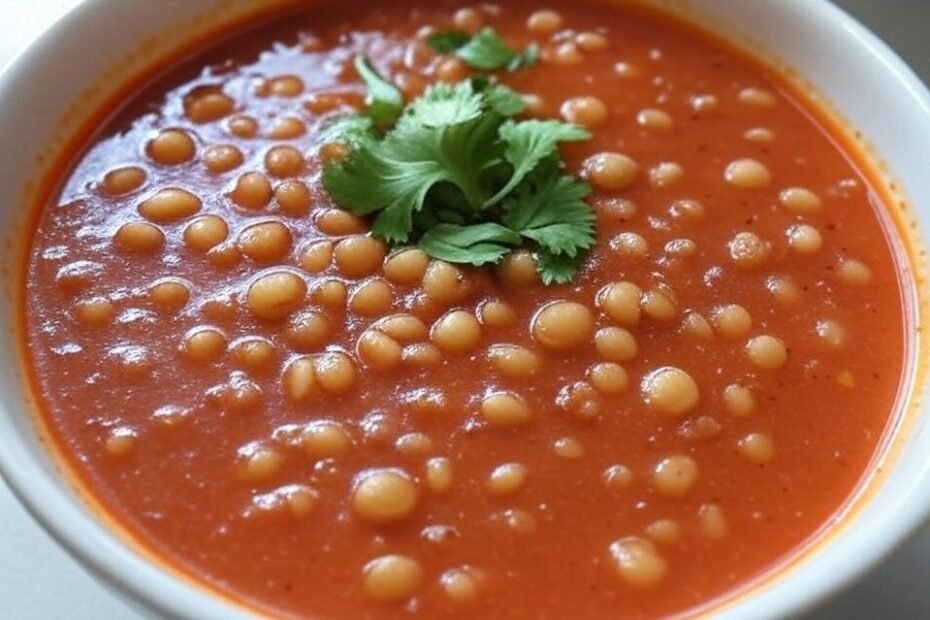There’s something magical about the aroma of cinnamon, ginger, and fresh coriander simmering in a bubbling pot that instantly reminds me of home. I’m Aminah, a young chef from Marrakech, and today I’m sharing with you the recipe closest to my heart—Harira, a traditional Moroccan soup that has nourished generations, especially during the holy month of Ramadan.
Harira isn’t just food. It’s a warm hug in a bowl. It’s the first spoonful we take after a long day of fasting, a dish that brings families together, rich in flavor and steeped in history. Growing up, I’d watch my grandmother prepare it with practiced ease—measuring spices by hand, stirring gently, and humming as the tomatoes and lentils melted into a velvety base. Now, I carry that tradition forward, adding my own touch while honoring the essence of the original.
Let me guide you step by step, just like my grandmother guided me.
Ingredients for Traditional Moroccan Harira
Proteins & Legumes:
- 200g (about 7 oz) boneless lamb or beef, finely chopped
- 1/2 cup dried chickpeas, soaked overnight and peeled
- 1/2 cup green or brown lentils, rinsed
Vegetables & Base:
- 1 large onion, finely chopped
- 2 celery stalks with leaves, finely chopped
- 4 ripe tomatoes, peeled and pureed (or 1 cup canned tomato puree)
- 1/4 cup fresh coriander, finely chopped
- 1/4 cup fresh parsley, finely chopped
- 2 tablespoons tomato paste
Spices:
- 1 teaspoon ground turmeric
- 1 teaspoon ground ginger
- 1 teaspoon ground cinnamon
- 1 teaspoon black pepper
- Salt to taste
Other:
- 2 tablespoons olive oil
- 1/4 cup vermicelli or broken angel hair pasta
- 2 tablespoons all-purpose flour
- 6–7 cups water or meat broth (adjust for consistency)
- Lemon wedges and dates for serving (optional but traditional)
Step-by-Step: How I Make Harira at Home
Step 1: Build the Flavor Base
I start by heating the olive oil in a large heavy-bottomed pot. In goes the chopped onion, celery, and meat. I sauté them gently for about 5 minutes, until the meat begins to brown and the onions are translucent.
Step 2: Add the Heart
Next, I add the turmeric, ginger, black pepper, cinnamon, and salt. My kitchen begins to smell like every Moroccan evening I remember—comforting and rich. I stir in the tomato paste, followed by the pureed tomatoes, parsley, and coriander. This combination creates the soul of the soup.
Step 3: Simmer to Perfection
Now it’s time to add the soaked chickpeas, lentils, and 6 cups of water (or broth, if you want it even richer). I bring everything to a boil, then reduce the heat and let it simmer gently for about 45 minutes. This is when the flavors begin to marry.
Step 4: Thicken the Soup
Meanwhile, I mix the flour with half a cup of cold water to make a smooth slurry—no lumps! This is a traditional way of thickening Harira without cream. After 45 minutes of simmering, I slowly pour this into the soup while stirring constantly. It thickens beautifully.
Step 5: Final Touches
About 10 minutes before serving, I add the vermicelli and let it cook right in the pot. Stir often so nothing sticks. Taste and adjust the salt or spices if needed.
Prep Time, Cook Time & Serving
- Prep Time: 20 minutes (excluding chickpea soaking)
- Cook Time: 60–75 minutes
- Serves: 6 hearty bowls
How We Serve Harira at Home
In my family, Harira is served hot with lemon wedges, sweet dates, and sometimes chebakia—a sesame honey pastry—for that sweet-savory balance. The first sip is always the best, tangy from the lemon, earthy from the lentils, with just a whisper of cinnamon.
During Ramadan, Harira is our tradition. Outside of it, it becomes comfort food on a rainy day or a soulful dinner for guests. Either way, it’s always served with love.
Nutrition Breakdown (Approximate per Serving)
- Calories: 300–350 kcal
- Protein: 20g
- Carbohydrates: 30g
- Fiber: 7g
- Fat: 12g
- Iron & Folate: High due to lentils and herbs
- Vitamins: Rich in Vitamin C, A, and B6
Harira is not just delicious—it’s also nutritious, especially during fasting when the body needs a balance of protein, fiber, and slow-digesting carbs.
From my Moroccan kitchen to yours, I hope this Harira becomes part of your family traditions too. Every spoon tells a story—and now, part of it is yours. Bon appétit, or as we say in Morocco, Bssaha!
